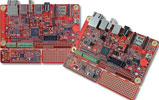

At Embedded World 2012, Embedded Artists and NXP Semiconductors introduced a powerful new Android Open Accessory Application (AOAA) development kit with two high-performance NXP microcontrollers based on the 32-bit ARM Cortex-M architecture.
Featuring the NXP LPC1769 and the LPC11C24 microcontrollers, the Embedded Artists AOAA kit makes it easy for designers to develop, evaluate and prototype more complex accessories for Android smartphones and tablets. The board’s unique gateway-centric design includes Ethernet, CAN and IEEE 802.15.4 interfaces as well as a remote CAN node, enabling designers to develop highly advanced accessories not only for consumer applications, but also for home, building and industrial automation applications requiring different types of connectivity.
The on-chip full-speed USB transceiver of the LPC1769, a 120 MHz Cortex-M3 based microcontroller, provides the interface to the Android mobile device. The LPC1769 also supports USB device mode, helping to future proof designs, should Android devices support USB host mode in the future. Other features of the LPC1769 include 512 KB Flash and 64 KB on-chip SRAM; Ethernet MAC; a CAN 2.0B controller; an 8-channel, 12-bit ADC; a 10-bit DAC; digital connections including UART/SPI/I²C, numerous timers and PWMs; and low-power capabilities.
The LPC11C24 microcontroller, based on the Cortex-M0 processor, provides remote CAN node capabilities to the AOAA kit and is connected to the LPC1769 via an onboard CAN network. The LPC11C24 allows designers to develop industrial control applications using CAN, by taking advantage of control functionality for temperature, light and other sensors, which are built directly on the AOAA kit.
Users of the Embedded Artists AOAA kit will receive all the software needed to get started with their designs, including reference applications to test and build Ethernet, CAN and wireless functions. The royalty-free reference applications, which are available for download from Embedded Artists, include controlling and monitoring the AOAA board from an Android device; using the Android device to detect, control and monitor CAN nodes in a CAN network; and using the Android device to detect, control and monitor Xbee nodes.
The AOAA kit is also a fully extensible development tool, as plug-in modules from Embedded Artists can be added quickly and easily. Furthermore, free software support libraries are available for download at LPCware.com, including the emWin graphics library, nxpUSBlib, lwIP TCP/IP stack and more.
For more information contact EBV Electrolink, +27 (0)21 402 1940, [email protected], www.ebv.com
| Tel: | +27 11 236 1900 |
| Email: | [email protected] |
| www: | www.ebv.com |
| Articles: | More information and articles about EBV Electrolink |

© Technews Publishing (Pty) Ltd | All Rights Reserved